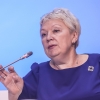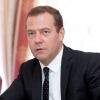The participants of the workshops devoted to innovative development of Russia’s regions came to the understanding that universities should serve as interaction platforms that help the government, business and society communicate. To make these connections stronger the experts offered to invite heads of Russia’s federal subjects to become members of supervision boards at universities. Georgy Poltavchenko, Governor of St. Petersburg, who also took part in the meeting, appreciated this initiative. The Governor also noted that he has headed the board of Saint Petersburg State University of Aerospace Instrumentationand also serves as a member of other universities’ supervision boards.
“I suppose that regional governments have to cooperate with universities and also know about what exactly they need so as to provide appropriate assistance. Despite being large "national" universities, they play a leading role in their particular region's development,” said the Governor.
Speaking of this topic Dmitry Medvedev offered to develop special recommendations for the officials who will join supervision boards of “key universities” so as to take into account requirements and peculiarities of regions and certain universities.

“St. Petersburg is a unique city as it has many universities much like in Moscow. A governor cannot become a member of the supervisory board of every university. However typical regions are to include only several “key universities,” so it is planned thatregional government officials be members of all supervisory boards. It means that stakeholders interact directly. It is the regional-based communication model that we discussed at the Forum,” mentioned Mr. Medvedev.
During the discussion focused on technologies used in the fields of higher education Dmitry Medvedev announced the development strategy for the digital educational area in Russia. He said that by 2017 the number of online courses at the National Platform “Open Education” will have increased up to 500, up to 1000 in 2018 and up to 2000 in 2020. The number of users will also need to increase proportionally, that is, 20,000 in 2017, 100,000 in 2018 and 200,000 in 2020. However the Prime Minister expressed that the initiative should be developed as long as it does not affect the quality of а classical education. He also expressed concern about the quality assurance of online courses.
“First of all the lecturers who serve in the field of digital education have to be high-qualified and well-known. There are a lot of gifted newcomers who started their work not long ago but we can only rely on those lecturers who are in demand. It would be desirable to establish direct contacts with prominent universities. If a course will be recommended by Moscow or St. Petersburg State University as well as ITMO University or other large universities, representatives of which take part in this meeting, this course will be considered as a prestigious one. If a course is not supported by any well-known university it will be less popular even if it is good.”
The next topical issue was salaries of researchers and lecturers. According to the participants of the Forum, this problem is connected with such issues as increasing the quality of Russian education and implementation of innovations.
“In the last few years Southern Federal University has managed to develop a payment system, which includes minimum monthly wages for research assistants equal to 15,000 rubles and for professors who earn 42,000. However when we launched an academic mobility project we faced the following problem: minimal wage is not enough for a good quality of life especially when we talk about young lecturers,” noted Anastasia Nikitaeva, professor at the Department of Information Economy.

Ms. Nikitaeva suggested to set a new rule, according to which the minimal wage of researchers and lecturers would be about 60-70% of the overall remuneration of staff. The salary of an associate professor shouldn’t be less than 100% of the average salary in a region. The Prime Minister added that according to governmental decrees related to salaries of school teachers and university lecturers, wages are increased by means of additional payments that are not scheduled. It explains the concern of lecturers and professors – the officials are ready to make them regularly paid.
“If rectors of universities agree with the idea that regular salary has to be much higher than a reward we are ready to consider this,” said Dmitry Medvedev.
Making progress in science is impossible without governmental support, commentedDmitry Medvedev. That is why the Government plans to develop new projects but at the same time support those that were developed before.
“It is a positive initiative to use private funds for the development of science. We should support it and enhance the number of partners in this field. However grants and state-supported projects are the main financial sources all around the globe. It is an illusion that one can “isolate” science and make it completely private-funded. Involving business and other institutions interested in scientific development the state has to play a main role in it. Here we’ve come to the understanding that it is necessary to support current projects related to grant development, National Technology Initiative, “Megagrant” project and Project 5-100.”
Summarizing the meeting the Prime Minister declared that the results of the discussions and presented documents will be used as the basis for certain state contracts.



